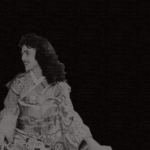Works Cited
Atkins, E. Taylor. Blue Nippon: Authenticating Jazz in Japan. Durham: Duke University Press, 2001.
Bourdaghs, Michael K. Sayonara Amerika, Sayonara Nippon: A Geopolitical Prehistory of J-Pop. New York: Columbia University Press, 2012.
Boyer, Paul S. By the Bomb’s Early Light: American Thought and Culture at the Dawn of the Atomic Age. New York: Pantheon, 1985.
Caputi, Jane. “The Metaphors of Radiation; Or, Why a Beautiful Woman is Like a Nuclear Power Plant.” Women’s Studies International Forum 14, no. 5 (1991): 423–42.
Carby, Hazel. “It Jus Be’s Dat Way Sometime: The Sexual Politics of Women’s Blues.” Chapter 27 in The Jazz Cadence of American Culture, ed. Robert G. O’Meally. New York: Columbia University Press, 1998.
Cope, Julian. Japrocksampler: How the Post-War Japanese Blew Their Minds on Rock’n’Roll. London: Bloomsbury, 2007.
Dean, Maury. Rock ’n’ Roll Gold Rush: A Singles Un-Cyclopedia. New York: Algora, 2003.
Deveaux, Monique. “Feminism and Empowerment: A Critical Reading of Foucault.” Feminist Studies 20, no. 2 (1994): 223–47.
Dower, John W. Embracing Defeat: Japan in the Wake of World War II. New York: W. W. Norton, 2000.
Ducille, Ann. “Blue Notes on Black Sexuality: Sex and the Texts of Jessie Fauset and Nella Larsen. Journal of the History of Sexuality 3, no. 3 (1993): 418–44.
Eiji, Takemae. The Allied Occupation of Japan. Translated and adapted from the Japanese by Robert Ricketts and Sebastian Swann. New York: Continuum, 2002.
Furmanovsky, Michael. “American Country Music in Japan: Lost Piece in the Popular Music History Puzzle.” Popular Music and Society 31, no. 3 (2008): 357–372.
Geerhart, Bill, and Ken Sitz. Atomic Platters: Cold War Music from the Golden Age of Homeland Security. Hamburg, Germany: Bear Family Records, 2005.
Hosokawa, Shuhei. “Soy Sauce Music: Haruomi Hosono and Japanese Self-Orientalism.” In Widening the Horizon: Exoticism in Post-War Popular Music, ed. Philip Hayward, 114–44. Bloomington: Indiana University Press, 1999.
Hume, Bill. Babysan: A Private Look at the Japanese Occupation. With commentary by John Annarino and Bill Hume. Tokyo, Japan: Kasuga Boeki K. K., 1953.
Jackson, Wanda. The Best of Wanda Jackson: Let’s Have a Party. Van Nuys, CA: Alfred, 2006.
Kovner, Sarah. Occupying Power: Sex Workers and Servicemen in Postwar Japan. Stanford, CA: Standford University Press, 2012.
Kurosawa, Susumu. Rutsu obu Japanizu poppusu: Rokabiri kara gurupu saunzu made / Roots of Japanese Pops, 1955–1970. Tokyo: Shinko Myujikku, 1995.
La Chapelle, Peter. “Country Music and Domesticity in Cold War Los Angeles.” In A Boy Named Sue: Gender in Country Music, ed. Kristine McCusker and Diane Pecknold, 24–43. Jackson: University Press of Mississippi, 2004.
Larrabee, Eric. “The Cultural Context of Sex Censorship.” Law and Contemporary Problems 20, no. 4 (Autumn 1955): 672–88.
May, Elaine Tyler. Homeward Bound: American Families in the Cold War Era. Revised ed. New York: Basic Books, 2008.
McClary, Susan. Feminine Endings: Music, Gender, and Sexuality. With a new introduction. Minneapolis: University of Minnesota Press, 2002.
McGoldrick, Gerry. “From Annie Laurie to Lady Madonna: A Century of Cover Songs in Japan.” Volume! La Reprise dams les musiques populaires 7, no. 1 (2010): 1–28.
Morrison, Craig. Go Cat Go! Rockabilly Music and Its Makers. Music in American Life. Urbana: University of Illinois Press, 1996.
Pilzer, Joshua D. Hearts of Pine: Songs in the Lives of Three Korean Survivors of the Japanese “Comfort Women.” Oxford: Oxford University Press, 2012.
Plasketes, George, ed. Play It Again: Cover Songs in Popular Music. Ashgate Popular and Folk Music Series. Farnham, UK: Ashgate, 2010.
Sanjek, David. “Can a Fujiyama Mama Be the Female Elvis? The Wild, Wild Women of Rockabilly.” In Sexing the Groove: Popular Music and Gender, ed. Sheila Whiteley, 137–67. London: Routledge, 1997.
Schloss, Joseph G., Larry Starr, and Christopher Waterman. Rock: Music, Culture, and Business. Oxford and New York: Oxford University Press, 2012.
Shibusawa, Naoko. America’s Geisha Ally: Reimagining the Japanese Enemy. Cambridge, MA: Harvard University Press, 2006.
Ruth A. Solie, “Whose Life? The Gendered Self in Schumann’s Frauenliebe Songs.” In Music and Text: Critical Inquiries, ed. Steven Paul Scher, 219–40. Cambridge: Cambridge University Press, 1992.
Stevens, Carolyn S. Japanese Popular Music: Culture, Authenticity and Power. London and New York: Routledge, 2008.
Thompson, Stephen I. “American Country Music in Japan.” Popular Music and Society 16, no. 3 (1992): 31–38.
Wald, Elijah. Escaping the Delta: Robert Johnson and the Invention of the Blues. New York: Harper Collins, 2004.
Waseda, Minako. “Looking Both Ways: GI Songs and Musical Exoticism in Post-World War II Japan.” Yearbook for Traditional Music 36 (2004): 144–64.
Wolfe, Charles K. “‘Jesus Hits Like an Atom Bomb’: Nuclear Warfare in Country Music, 1944–56.” In Country Music Goes To War, ed. Charles K. Wolfe and James Edward Akenson, 102–25. Lexington: University Press of Kentucky, 2005.
